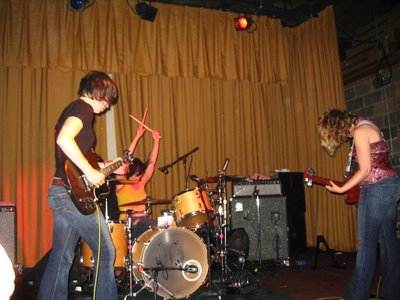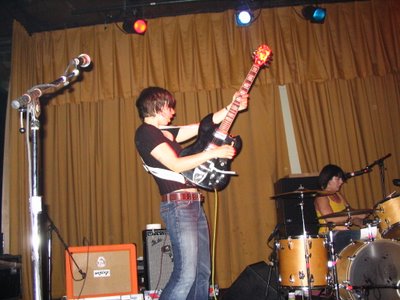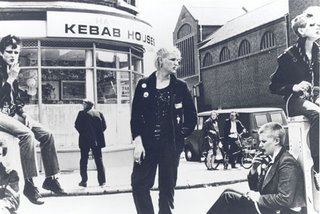Pop culture treasure, high culture trash.
Friday, June 30, 2006
S-er F-er
Spider Fighter are playing the Entry tonight round about 8:00, $6. When they played the Triple Rock a few months ago it bordered on historic. Come say hi--I'll be the tiniest pink stripe-haired lady in the room.
Tuesday, June 27, 2006
A sound they don't want you to own

The news broke for me today at 2:28 PM, in text message form--the musical equivalent of "yr beloved childhood friend/relative/golden retriever Sunshine passed away":
SLEATER-KINNEY ARE NO MORE :-(
I practically ran out of work, took a deep breath and began making the necessary phone calls. I called Anjanette about 8 times, even though I knew that her phone was broken and she couldn't pick it up.
It's very hard to verbalize what this band has meant to me, how deeply they have influenced my appreciation of music and music history. Seeing them play has made me proud to be a woman, a feminist, queer, and alive, but most of all, it has reminded me that there are others out there for whom music is not just a status symbol or fashion accessory or excuse to get drunk on a Tuesday night. Watching them jump and scream and hammer at axes and drum kits it was always beautifully, vividly apparent that to them, music was a matter of life and hope and breath, not haircuts and scenester posturing.
Rob Mitchum once described Sleater-Kinney as "obliterat[ing] the gender card," and that is exactly what they did. After a certain point in their development, they refused to talk about how being women influenced their musicianship--refused, that is, to be seen as anything other than a band, full stop. And strangely, that turned out to be as feminist an accomplishment as anything they wrangled circa Call the Doctor and s/t. Because while we absolutely, urgently need people like Le Tigre talking explicitly about feminism and insisting that their experiences as (marginalized, queer, abused, objectified) women inform their lives and music, we also need bands exploding the girl ghetto and proving that there is nothing inherently male about rock virtuosity and prowess. We need Janet schooling Bonham. We need Corin unfurling R. Plant soul-howls. We need Carrie windmilling and leaping off monitors and pouring out 1/16 notes with eyes-closed fury and abandon and release, making roomfuls of 30-year-old crit boys ask, "Pete Townshend was who again?" Because when that happens, the still-solid glacier of misogynist rock tradition melts just a little, and gets that much more reappropriable for those of us who were never going to be yr mama or smile pretty, take take the money.
now do you hear that sound
as the model breaks?
take the stage
let the image of him fade away
go back and tear the pictures from the page
it's time for a new rock n' roll age
history will have to find a different face
and if you're ready for more
I just might be what you're looking for
Sleater-Kinney were what we were looking for. After August 11th, we'll have to find it somewhere else.

Lady Mairead delivers a fine eulogy here.
Saturday, June 24, 2006
Elephants go oral
Someone would be like, "I scored a Farfisa at the J&J Thrift Center for $40!" So it would be like, "Of Montreal wants a Farfisa on this song. Call Laura." Will Hart scored a guitar organ, so of course there's a little wave where everyone's album has a guitar organ on it. And then I got the zanzithaphone. It's really a Casio digital horn, but I was not about to have my credit on the Neutral Milk album be for Casio digital horn, so I called it the zanzithaphone. It was very much about who found what instrument when, and how long before that instrument broke.
An oral history of Elephant 6.
An oral history of Elephant 6.
Sunday, June 18, 2006
Blank degeneration

One of many apparitions in Tony Kushner's Angels in America, an 18th century dandy paying visit to a sickly descendent, observes with bemused dismay having arrived in 1985 New York, "The twentieth century! Oh dear. The world has gotten so terribly, terribly old."
Like most ghosts who show up in plays, he knows what he's talking about. The world has become disturbingly antique--it's just that parts of it have a trick about seeming more decayed than others. The United States (if only in stodgy, post-colonialist nation-state terms) is still hardly more than a toddler, wobbling down the transglobal sidewalk on chubby legs and dropping its pacifier in the mud. Compared to a more mature Western country like, say, England, it's got about as much historical depth and baggage as last week's episode of "Wife Swap." The difference is a rich English heritage but also a punishing debt, legacy, and accretion of guilt; that is to say, the weight of a collective national onus more than a thousand years in the making. Imagine what living in the U.S. might be like if it'd been suffering fools and faking wars since 876 rather than 1776.
When Queen Elizabeth I travels into the future to discover her kingdom's destiny in Derek Jarman's Jubilee, she finds an apocalyptic post-Britain driven mad by its terrible oldness. Gangs of girl-Londoners go on public rampages of torture and murder, heaps of rubbish burn seemingly nonstop, and political power has all but yielded to a creepy, bald media impresario called Borgia Ginz. Ginz is perhaps meant to recall the ruthless Italian Renaissance family and mobster collective of his first name, and Jack Birkett, with his bugged-out eyes, maniacal giggle and meth addict's leer, plays Ginz as a kind of queeny, arachnid Cesare Borgia fully prepared to enjoy the benefits of his self-made autocracy. He is orbited by a duo of mute lady supermodel-types (rather unconvincing given the way he ogles Adam Ant) as well as the terrorist gang whose bickerings and crime sprees make up much of the film. Leader Bod (Jenny Runacre), sadist Mad (Toyah Willcox), nympho Crabs (Nell Campbell) and cynical historian Amyl Nitrate (Jordan) share a dingy bunker of an apartment and go on group trips to the corner chip shop to kill the cook.
In the end, Jubilee narrowly misses being a radical feminist film. Its leading female characters seem driven by a righteous, primal rage, as if the accumulating centuries of gender inequality have finally taken their toll and inspired the women of England to take to the streets. Mad ridicules Crabs for sleeping with men, spitting, "Sex is for geriatrics!" and carves the word LOVE into Bod's back with a knife. Viv, a peripheral member of the gang, is having a giddy three-way with two brothers (Angel and Sphinx, who are also happily doing it with each other), and everybody is a prickly, beauty-fucking, androgynous mess. It's a shame, then, that the majority of the gang's victims are women, and not just biological ones. Wayne County has a few seconds of prancy karaoke screentime before Mad and the girls arrive to push her about, shove her to the ground and throttle her to death. Mad's satisfaction in the murder appears to arise from something akin to transphobia, and the scene mimics too many other on-screen tranny-killings in which the perverted she-man is left splayed on the floor, wig torn off, and exposed for the fraud she really is.
Similarly, Angel and Sphinx's deaths at the hands of the police, though granted an emotional gravitas and tragedy rare in the rest of the film, are instigated by Angel's blithe come-on to an approaching officer, "Give us a kiss!" Jubilee has (bizarrely) drawn criticism from some for being politically conservative, and this is the only place in which such a reading holds water; by presenting sexual freedom side by side with corruption, looting and murder as an effect of a crumbling society, the film implies that queerness might not have a place in the reformed utopia for which it longs.
Running through Jubilee like a Manic Panic'd neon pink stripe is the first-wave punk aesthetic that insiders like Vivienne Westwood feared the film would exploit. She needn't have worried; the fashion and music on display bristle with authenticity, and Jarman gets it right. Adam and the Ants turn in a scalding performance of "Plastic Surgery" (note the pointed anti-exploitation, anti-music biz commentary that follows the song) and a decidedly un-skinny Amyl sexes up "Rule Britannia" with snap garters and grrrl snark that foreshadow Corinne Burns in Ladies and Gentlemen, The Fabulous Stains. Like Corinne's, Amyl's trashy rent girl stage persona is an escape ladder out of her oppression rather than an effect of it, even as the flat tone of her "sexy" posturing suggests a behind-the-scenes male puppetmaster, controlling her movements, options, and body-as-commodity.
Jarman's interest in gender and British social history informs a Warholian understanding of the pop star as artificial, irresistible,and a little bit toxic. Ginz's pet musicians (engineered with Malcolm McLaren-like cunning) have lost control of their careers before those careers even begin, giving themselves up to an increasingly deranged popular culture in which art is dead but Top of the Pops is always on. "The world is no longer interested in heroes," Mad tells us. "We now know too much about them." And what are pop stars, if not heroes who've been interviewed in Vanity Fair one too many times? As Jubilee concludes in a last gasp of violence and grief, it becomes painfully obvious that its plea for compassion and realness originates not in a parallel universe, but our own.
Wednesday, June 14, 2006
Nach David Bowie, die Sintflut
Many Pogo reviews and critiques TK--first, From the Closet to the Charts: Queer Noises, 1961-1978, distro'd by Light in the Attic Recs. Yes, it is a compilation, and yes, the first 20 tracks are sounding stellar to our eager ears; we just need a little more time for digestion and tracks 21-24. All I'll say for now is it's stunning, it's disturbing, and it's what Morrissey listens to on minibreak (surely!).
Second: Jubilee, found today by Anjanette at the library. Take note, Minneapolitans! Yr newly renovated main library offers, gratis, The Color Purple, Mansfield Park, Prick Up Your Ears, Rip It Up and Start Again, the NME, and films wherein "bands of teenage girl punks roam the streets." There is a shockingly uncondescending teen section with copies of Mellon Collie next to stereos and centrally displayed Alex Sanchez novels where you might expect Hanson and Meg Cabot. That is tax money well spent, kittens. We lugged our spoils back from downtown in my bag like so many gold dubloons.
Finally: tomorrow night I may be at this. Will you? I know a lady who knows a lady who plays the elevator operator.
Second: Jubilee, found today by Anjanette at the library. Take note, Minneapolitans! Yr newly renovated main library offers, gratis, The Color Purple, Mansfield Park, Prick Up Your Ears, Rip It Up and Start Again, the NME, and films wherein "bands of teenage girl punks roam the streets." There is a shockingly uncondescending teen section with copies of Mellon Collie next to stereos and centrally displayed Alex Sanchez novels where you might expect Hanson and Meg Cabot. That is tax money well spent, kittens. We lugged our spoils back from downtown in my bag like so many gold dubloons.
Finally: tomorrow night I may be at this. Will you? I know a lady who knows a lady who plays the elevator operator.
Wednesday, June 07, 2006
Punks on film
Derek Jarman's Jubilee: now in serious competition around Pogo HQ with Fanmail for Most Dreamily Wished-For Yet Almost Unfindable Obscure Indie Film. Queer activist and film pioneer Jarman ruled the (British!) post-punk music video scene, producing clips for Orange Juice, the Smiths, Marianne Faithfull, and the Pet Shop Boys as well as controversial meditations on icons like St. Sebastian, Edward II, Caravaggio and Wittgenstein before his death from AIDS in 1994. Smartie actress Tilda Swinton, who worked with Jarman on Caravaggio, has an amazingly poignant, witty, dishy and in-depth tribute here.
1978's Jubilee was scored by Brian Eno and promises a stunning who's who of first-wave punk faces and haircuts, including those of W/Jayne County, the Slits, and an outrageously young 'n femmey Adam Ant. And seriously, somebody should retroactively subtitle it "A Punk Fantasia on National Themes" (with apologies to Tony Kushner):
Jubilee doesn't bemoan the rise of a punk counterculture as indicative of England's failures. In the film, what goes wrong is not punk, but England. Here the subculture is posited as a reaction to a social and political environment of diminishing returns. Jubilee depicts a post-apocalyptic England, rife with class warfare and directly reflective of the deep recession and state-imposed three-day workweeks of the year of Queen Elizabeth II's Silver Jubilee. Working class London literally burns while the rich idle away at country estates. Global ruler and media mogul Borgia Ginz (Jack Birkett) has turned Buckingham Palace into a huge recording studio, and Westminster Abbey into a gay go-go boy nightclub. Borgia recognizes his own power and influence when he asserts, "If the music's loud enough, we won't hear the world falling apart."
-Todd Ramlow, PopMatters
Thursday, June 01, 2006
W! ASH! ING!/ TON, baby.
After I take her grocery shopping we go back to her house for tea. She dives through bulging cabinets for saffron, but retrieves only a moldy glass jar with some seeds in it labeled "1997."
"Hibiscus pods!" she grins. "I stole them from the British consulate."
"In...1997?"
"Yes! I was downtown at the embassy. I stood up against the gate, leaned over into the garden and brushed them into my jar. Nobody saw me."
"Dodo!"
"Well, they were going to be wasted, falling onto the ground like that."
She brews the tea and I put gingerbread cookies on a plate. I ask if we're going to sit in the dining room or the kitchen and she clucks, "Oh no, we'll sit in the dining room, like white people." I shudder, because 1) this is gruesome, and 2) I am not sure how best to call out an 89-year-old woman on her racism. It is only partially comforting later when we discuss her daughter, the one in the civil air patrol. She flies helicopters over D.C., in part to protect the White House, but Dodo wonders whether it wouldn't be better if hostile aircraft were encouraged to attack Mr. Bush. "How did that man ever get in there?" she spews.
****************************************************************
Later I walk to the ice cream store where all the punk kids used to work and find out that it's closing. They worked at the hardware store down the block, too, where they got to sell hammers to Ian MacKaye and brag about it the next day in school. The hardware store is now a less-than-Irish Irish pub, and the ice cream store, stage for adolescent dating dramas and underage shows alike, is soon to play its last mix tape over the stereo. It was no Olympia (the boys carried the amps while the girls reapplied lip gloss and there was way too much Weezer on those mix tapes) but it was ours, and it gave more than one punk I knew money enough for vinyl and guitar strings and a little independence. Where is the next generation of self-pitying, alienated fuck-ups and closet cases going to gather to discover London Calling and stare at their high-top Converse? The Pottery Barn?
Soon, that'll be all that's left.
"Hibiscus pods!" she grins. "I stole them from the British consulate."
"In...1997?"
"Yes! I was downtown at the embassy. I stood up against the gate, leaned over into the garden and brushed them into my jar. Nobody saw me."
"Dodo!"
"Well, they were going to be wasted, falling onto the ground like that."
She brews the tea and I put gingerbread cookies on a plate. I ask if we're going to sit in the dining room or the kitchen and she clucks, "Oh no, we'll sit in the dining room, like white people." I shudder, because 1) this is gruesome, and 2) I am not sure how best to call out an 89-year-old woman on her racism. It is only partially comforting later when we discuss her daughter, the one in the civil air patrol. She flies helicopters over D.C., in part to protect the White House, but Dodo wonders whether it wouldn't be better if hostile aircraft were encouraged to attack Mr. Bush. "How did that man ever get in there?" she spews.
****************************************************************
Later I walk to the ice cream store where all the punk kids used to work and find out that it's closing. They worked at the hardware store down the block, too, where they got to sell hammers to Ian MacKaye and brag about it the next day in school. The hardware store is now a less-than-Irish Irish pub, and the ice cream store, stage for adolescent dating dramas and underage shows alike, is soon to play its last mix tape over the stereo. It was no Olympia (the boys carried the amps while the girls reapplied lip gloss and there was way too much Weezer on those mix tapes) but it was ours, and it gave more than one punk I knew money enough for vinyl and guitar strings and a little independence. Where is the next generation of self-pitying, alienated fuck-ups and closet cases going to gather to discover London Calling and stare at their high-top Converse? The Pottery Barn?
Soon, that'll be all that's left.
Subscribe to:
Comments (Atom)
